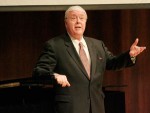Title
For those who have heard voice faculty member Robert White perform works by composers such as Schubert, Debussy, and John Corigliano, it may be difficult to imagine him as a 9-year-old singing holiday medleys with the DeMarco Sisters on Fred Allen’s radio show. However, audience members in Paul Hall on March 19 had the distinct pleasure of listening to Robert White do all of the above.
Body
Each year, the Literature and Materials of Music Department bestows the William Schuman Scholars Chair on a faculty member who enhances the artistic and intellectual life of the Juilliard community. As this year’s recipient, tenor Robert White reflected upon his long and varied career by sharing anecdotes, recordings, live performances, photos, and video clips with the audience at his lecture (the first of two) titled “A Life in Song: Celebrating Six and One-half Decades of Singing.”
President Joseph Polisi commenced the presentation, delivering a brief history of the award’s namesake, composer and former Juilliard President William Schuman (who is the subject of a biography written by President Polisi that will be published this fall). Edward Bilous, chairman of the L&M Department, introduced White by lauding the honoree’s lack of “separation between heart and mind.” Bilous was a student at the Manhattan School of Music when he first met the tenor, who was then a popular music history teacher known for his “open-mindedness.” White has been on Juilliard’s faculty since 1992, inspiring students and the general public alike through his teaching and performing.
Over the course of the lecture, White gave several live performances. To begin and to welcome the new season, he and pianist Philip Fisher charmed listeners by performing three songs about spring. White’s expressive voice brought out distinct characters in the works of Franz Schubert, Thomas Morley, and Richard Rodgers.
After this impressive opening, Mr. White turned the focus to the advent of his career. Inspired by his father, Joseph White (the so-called “Silver-Masked Tenor” of radio-show fame), Robert White began performing on the radio at a young age. To the delight and amusement of the audience, he played several radio clips, including one from Fred Allen’s 1947 Christmas show. Even though White poked fun at his childhood rendition of “Deck the Halls,” his remarkable boy-soprano voice displayed the clarity and strength characteristic of his singing today.
Returning to the present, he performed works by Chausson and Debussy, this time joined by pianist Benedicte Jourdois. The lecture continued with the introduction of an excerpt taken from a Chinese TV interview. In the film, White imparted some thoughts on music, namely that music “speaks directly to the heart.” The film also provided insight into the tenor’s teaching philosophy: while working with Juilliard student Keith Fearon, Mr. White revealed that he does not try to find quick fixes for his students’ problems. Instead, he is determined to help his students find long-term solutions. He feels it is a “great privilege as a teacher to help the [student’s] voice come out.”
For the next portion of the presentation, he shared some of his favorite songs and recordings. A prolific recording artist, White opted to play a recording of Handel arias that he had made with the City of London Baroque Sinfonia for the Virgin Classics label. The excerpt further illustrated his musical versatility, highlighting his ability to sing the Baroque work’s long, lyrical phrases.
White concluded the program by paying tribute to nine of his “composer friends.” A proponent of new music, he encouraged musicians in the audience to “get to know the composers. They are our lifeblood … I’ve had many wonderful composer friends.” White certainly practices what he preaches, as exemplified by the many recordings of contemporary songs he presented. From the beautiful, soft sounds of Lowell Liebermann’s “The Haunted Chamber” to the rich tone of Samuel Barber’s “Sure on the Shining Night,” the eclectic collection of songs showed great variety of color. As evidenced by John Corigliano’s dedication of “Song to the Witch of the Cloisters” and Gian Carlo Menotti’s gift of “The Old Man’s Song” to Robert White, the tenor has been an influential performer of his friends’ music. As a fitting close to the lecture, he played a recording that he had made with Samuel Sanders of William Schuman’s song “Orpheus With His Lute.”
Robert White’s presentation was a thoroughly entertaining retrospective of his multifaceted career. Composer and L&M faculty member Eric Ewazen, whose song “The Tiger” was presented during the lecture, said, “I consider him to be the consummate musician. With his love of all periods and styles of music and his interest in performing new music, he is an inspiration to students, colleagues, and the audience.”





